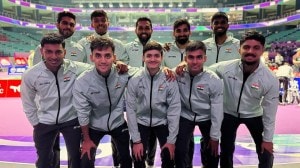- India
- International
How police in Delhi, UP scripted a social media success story
Since 2012, the ‘National Police Group’ on Telegram, which comprises only constables, head constables, assistant sub-inspectors, sub-inspectors and inspectors from 28 states, has helped crack several cases.
 Delhi Police Inspector Raj Pal Dabas (above) started group with UP Police officer Vinod Singh Sirohi. (Express photo by Mahender Singh Manral)
Delhi Police Inspector Raj Pal Dabas (above) started group with UP Police officer Vinod Singh Sirohi. (Express photo by Mahender Singh Manral)
Hours after former Bihar MLA Raju Singh absconded after allegedly shooting a woman at a New Year’s party in the Capital last month, a Delhi Police sub-inspector posted details of his car and a mobile tower location on a group on the Telegram app. It was this message that helped a police officer from Uttar Pradesh track down Singh’s vehicle in Gorakhpur a few hours later, following which Singh and his driver were arrested.
Since 2012, the ‘National Police Group’ on Telegram, which comprises only constables, head constables, assistant sub-inspectors, sub-inspectors and inspectors from 28 states, has helped crack several cases. An officer is added only via reference to the group, which has become an informal way for police to get prompt help from counterparts in other states. Nagaland and Lakshadweep are yet to find representation in the group.
The duo who started the group — Delhi Police Inspector Raj Pal Dabas and UP Police officer Vinod Singh Sirohi — earlier ran a group called ‘Hum Panchhi Ek Daal Ke’ on WhatsApp till 2012, before moving to Telegram in 2013. It has grown from 40 members in 2012 to around 1,400 now, and is one of three groups by the same name on Telegram.
“I came across police officers from various states when I was posted in the Special Cell, and stayed in constant touch with them, including Sirohi. In 2012, I joined the Delhi Armed Police and that’s when we decided to form a group on WhatsApp to share our experience and opinion on cases and criminals,” said Dabas, seated inside his Rohini residence where he was updating the list of people on the group in a computer document.
The duo have made several strict rules for members — no ‘good morning’ forwards or jokes, and no birthday greetings. “In 2013, we moved to Telegram where we added more people, but the limit was only 200 at the time. In 2014, we asked group members to suggest a name for the group, and settled on ‘National Police Group’. Now we have three versions of the group where we have added more police personnel,” he said.

Currently, a Telegram group can have as many as 4,000 members. Their groups’ display picture is the logo of the Prime Minister’s flagship ‘Make in India’ scheme. Over 4,000 photos and videos of criminals and incidents have been shared on the groups.
“I joined the group around four years ago and it has helped us share information in a very short span of time. Earlier, we would have to approach the other state’s police through a formal channel after sending several letters, but now we only have to share details in our group and the officer concerned immediately shares details with us. Even when someone has to come to our state, I provide all logistical help, and they do the same,” Athar Parvaiz, in-charge of Pattan police station in Baramulla district, said.
The group has had a palpable impact on solving cases.
On December 26 last year, several men robbed Rs 60 lakh from a man in northeast Delhi’s Welcome area. Police found CCTV footage, and one of the policemen posted footage of the incident in the group. After some hours, he received a call from a UP police constable, who identified one of the assailants. Police then found details about him and seven men were arrested.
“We started the group with an objective that people will share their experience and expertise on criminals. Now the scenario has changed and people are not just sharing details, but also helping other state police nab accused from their areas,” said Sirohi, Deputy Superintendent of Police (Noida STF).
What has worked for this group is its ‘unofficial’ nature. For years, the inter-state police coordination meetings to exchange intelligence and inputs have been a regular feature in the capital, but these are mostly for top officials. When it comes to the Telegram group, however, any cop who has an ear to the ground and possesses sharp investigative skills can be added. In most cases, administrators of the group recommend the names of officers who they think can contribute with credible information that can help others.
In 2017, when three snatching incidents were reported from Hyderabad City, police shared CCTV footage on the group. Minutes later, the accused was identified as a resident of Delhi’s Bhajanpura. “He had been absconding for the last two-three years. They found an old phone number of his girlfriend, which was active and she was constantly talking to a particular number based in Hyderabad. Several teams of the Delhi Police had been looking for him, and this group helped nab the accused,” a senior police officer said.
Dabas said that apart from the three ‘National Police Groups’, they are running several groups with more senior ranked officers. “I update their details every day and now we have members from other agencies as well — such as NIA, CBI, IB, NCB, RPF, customs and even officers from Nepal. In August 2016, police personnel in Chennai were faced with a train heist wherein a gang drilled a hole on top of a coach on the Salem-Chennai Express and decamped with Rs 5.78 crore in soiled currency. They shared details in our group and a police officer from Bhopal helped nab the accused,” he said.
Apr 26: Latest News
- 01
- 02
- 03
- 04
- 05








































